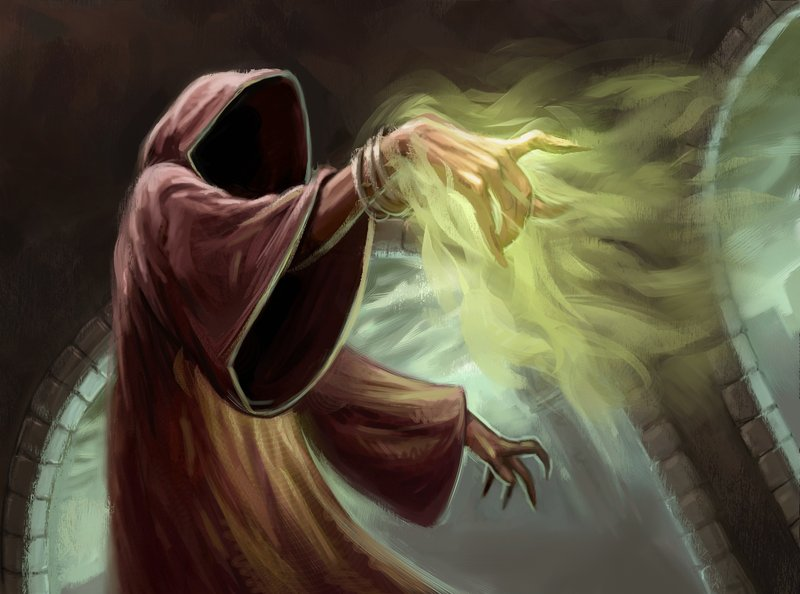Casting Methods
I cast... FIRE BALL!!!
Prologue
In the world of IDQ, there are two ways of using magic. One is thinking of the desired effect and using your mana. The other is using a casting method to help. The most commonly used ones are ritual casting and quick casting. Since the first method is self-explanatory, I will cover ritual and quick casting.Ritual Casting
All formal ritual casting requires circles. While spellcasters have learned how to use their spells in other ways, it is the first lesson taught. All major elements and the eight schools of magic have beginner circles. A basic requires three circles layered upon each other and a direction. For example, a fire mage uses three fire circles with the order forward. They would make a fireball launch forward. Now, replace one of the circles with a mana control ritual. While it is not as potent, the spell can now be directed more. There are thousands of combinations, but it is always best to stick with strengths instead of branching out.Quick Casting
Quick casting is for creative individuals who prioritize speed. These spellcasters sling their mana without any issue. But their spells aren't as powerful as those who use rituals. While they still employ circles, these mages only need one at most. In some instances, they use charms and items to act as a conduit for their casting. With enough practice, they are capable of forming Cantrips. These are spells with minor effects without much mana usage. A mage may only have a few cantrips at once. While not as customizable or powerful, their freedom and speed on the battlefield go unanswered.Mixing?
The question that's on everyone's mind. And the answer is kind of. These casting styles are complete opposites of each other. But a caster can use ritual casting for strong enemies and switch to quick casting for fast enemies. However, be wary of how it will affect your mana. It's possible to get whiplash from constantly swapping between the styles. Always be careful when handling your mana.Closing Statements
As previously stated, casting methods are an additional, not a requirement. Throughout history, casters have made great strides in their fields with ingenuity and proper resource management. But, if you want to see mana in a new light, try a casting method.Effect
You can trace a spell's effect back to their circles and commands. There are typically four categories: attacking, defensive, supportive, and utility. A skilled individual can also figure out the mechanics of a ritual that does not belong to them. However, it takes practice.
Side/Secondary Effects
Typically, there are no adverse effects when using a casting method. However, depending on the spell and the intensity, the spell can go out of control and affect the user.
Manifestation
Ritual and quick casting come in many forms. Some people use ritual circles, pictures, items, or whatever specialization people have discovered. The linking factor is mana. You need mana to activate your spells. People can transfer mana to another person or use mana from an outside source to power the casting. Group casting is how people made magical nukes or massive barriers.
Once activated, the circle or item will glow blue and change color based on the magic. Then, it will do the desired effect. Anything else will once again depend on the magic used.
Discovery
The person who discovered ritual casting is an ongoing debate. The most agreed-upon answer is a wizard. In the search for potent spells, they found that having a secondary conduit to focus their mana boosts their casting. With the basis covered, their colleagues help them streamline the process.
In contrast, everyone knows that a non-magic user created quick casting. When they began learning magic, they had trouble focusing their mana on rituals. Their rituals either fizzled or went out of control. Instead of forcing themselves to continue to learn, they leaned into the sporadic nature of their mana and went to outside sources. After a few months, they showed off quick casting. And soon, other people helped with its development.
Effect Duration
The duration depends on the spell type. Supportive spells last the longest, then defensive, then attacking. Utility spells are across the spectrum when it comes to their duration.
Effect Casting Time
The time relates to the method, circle size, and what the spell is trying to accomplish.
Applied Restriction
Restrictions are how people increase the strength of their casting. Maybe they can only use their spells with a specific item or a material sacrifice or need an item while performing their casting. Regardless, it is all set by the caster. If casters fail to meet the requirements, the spell won't work.
Remove these ads. Join the Worldbuilders Guild









Comments